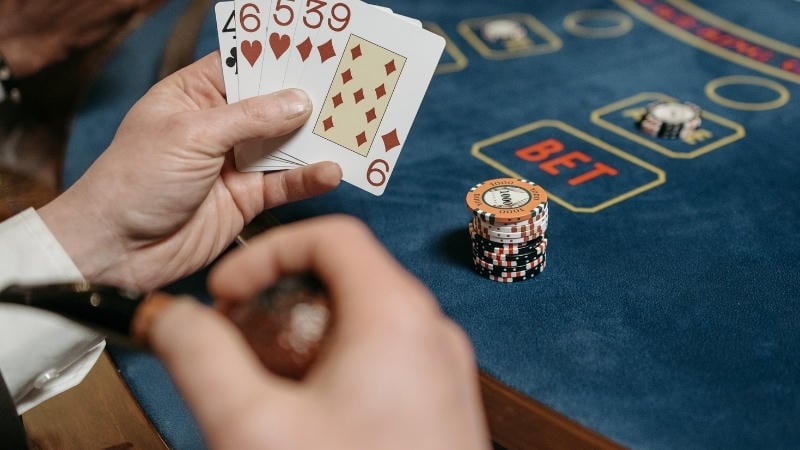In the world of gambling, one impulsive moment can cost you everything. Whether you’re a newbie or a seasoned player at 91 Club, it’s dangerously easy to fall into the trap of going broke. Below are 7 common mistakes that often lead players to “burn through their wallets” — and how to avoid them if you want to survive in this high-stakes game.
Betting Without a Clear Strategy
One of the common mistakes new players make is entering the game with no plan. Studies show that 65% of gamblers admit to placing bets “based on gut feeling,” resulting in heavy losses. That’s a fast track to losing control.

Players without a strategy often:
- Randomly increase bet sizes after a few wins
- Go all-in to “win it all back” after a loss
- Make reckless decisions under emotional pressure
This is one of the most common mistakes that drains your bankroll quickly. Remember, luck may give you a few wins, but long-term success is built on logic, planning, and patience. A solid strategy helps you stay disciplined, manage your funds wisely, and avoid impulsive moves that can lead to devastating losses. The more prepared you are, the better your chances of staying in the game.
Refusing to Stop and Chasing Losses
Another common mistake is not knowing when to quit. In a survey, 72% of players admitted continuing to play even after significant losses, hoping to recover.
Typical signs of this behavior include:
- Doubling down in desperation to recoup losses
- Ignoring pre-set loss limits
- Spiraling into emotional betting after losing streaks
This common mistake is the reason many walk away empty-handed even after early wins. Smart players set clear stop-loss and stop-win points — and actually stick to them. Learning to walk away at the right time not only preserves your bankroll but also helps maintain a healthy mindset and long-term enjoyment of the game.
Ignoring Proper Capital Management Rules
A fatal common mistake is underestimating the power of bankroll management. No matter how great your strategy is, you’re doomed if you don’t manage your bankroll wisely.
Some typical missteps include:
- Going all-in on a “sure bet”
- Not setting a limit for each wager
- Having no reserve fund during cold streaks
According to the 5% rule, you should never risk more than 5% of your bankroll on a single bet. For example, with $1,000, your max bet per round should be just $50.
Proper capital management isn’t optional — it’s your financial seatbelt in a fast-moving game. Without it, even the best strategies can’t save you from going broke. Maintaining discipline, tracking wins and losses, and knowing when to stop are just as important as the bets themselves. Smart players last longer — and often win more in the long run — simply because they play with control.

Letting Emotions Drive Betting Decisions
A natural but deadly common mistake is letting emotions override logic. After a few losses, you may feel desperate. After a few wins, you may feel invincible. Both mindsets are dangerous.
Signs of emotional betting include:
- Rage betting to “get back” at the house
- Overconfidence after a win streak
- Impatience and impulsive decisions
This common mistake affects even experienced gamblers. The trick is to stay cool-headed. Take a break every 45 minutes. Walk away when emotions rise. Discipline always beats drama in gambling.
Not Understanding Game Rules and Payouts
A surprisingly common mistake is jumping into a game without knowing the rules or payout structure. About 41% of new players admit they didn’t fully understand the game they were playing.
Examples:
- Betting on a tie in Baccarat without knowing it has a high house edge
- Playing slot games with very low RTP without realizing the odds
Not knowing the mechanics means you’re gambling blind — a common mistake that leads to frustration and fast losses. Read the rules. Learn the odds. Know what you’re up against.
Believing in “Winning” or “Losing” Streaks
Another mental trap and common mistake is believing in streaks. Some players assume that after many losses, a win is due — or that a winning streak will continue indefinitely.
Examples:
- Doubling bets after five losses because “a win must be coming”
- Cutting bets after three wins, fearing “bad luck is next”
This is a classic case of Gambler’s Fallacy — the false belief that past outcomes affect future ones. It’s one of the most deceptive and common mistakes in gambling psychology.
Each bet is independent. Treat it that way. No matter how many times a coin lands on heads, the next flip still has a 50/50 chance. Patterns seen in short runs can be misleading, and relying on them can lead to reckless decisions and major losses. Recognizing this fallacy is essential to staying rational and protecting your bankroll.

Using Borrowed Money or Essential Funds to Gamble
Perhaps the most dangerous common mistake of all: playing with money you can’t afford to lose. This includes using rent money, monthly salary, or borrowed funds.
Stats show that 19% of players have borrowed money to continue playing — many ended up deeper in debt, trapped in a cycle of chasing losses and accumulating interest.
Gambling should never be seen as a source of income. It’s entertainment with risk. Using critical funds is a common mistake that leads to serious consequences, both financial and emotional. Stress, anxiety, damaged relationships, and even legal trouble can result.
Only gamble with your “fun money” — never your survival money. Set clear limits, and walk away when those limits are reached. Responsible play is the only way to keep gambling safe and sustainable.
In gambling, especially at platforms like 91 Club, one impulsive moment can quickly lead to serious losses. This article highlights 7 common mistakes that drain your bankroll — and how to avoid them. Mastering capital management, emotional control, and setting clear limits are key. Stay informed, play smart, and never bet more than you can afford to lose.

